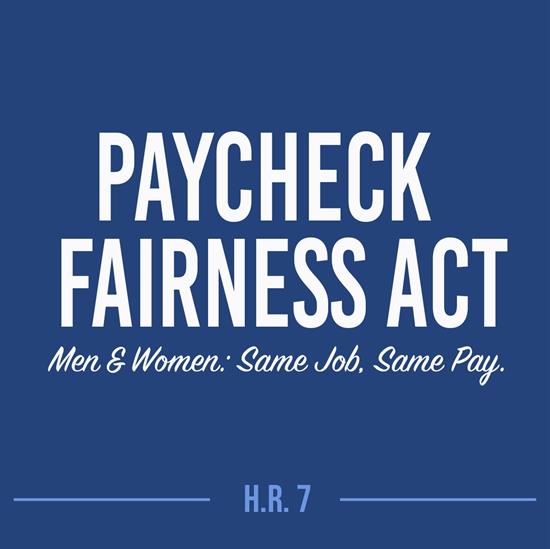Today, U.S. Rep. Kathy Castor (FL14) will announce at the Centre for Women’s Waves of Change event in Tampa details about H.R. 7, the landmark Paycheck Fairness Act that passed the U.S. House on Wednesday. The legislation takes a dramatic step forward to ensure that America’s women receive equal pay for equal work. This legislation strengthens and closes loopholes in the Equal Pay Act of 1963 to secure justice for working women in Florida and across the country by providing effective remedies for women subject to unfair and inequitable pay practices.
Waves of Change is today at 11:30 AM at the Marriott Waterside in downtown Tampa.
“Passage of the Paycheck Fairness Act is a victory for working women and their families. With the intervening years of a Republican majority, it has been 10 years since a Democratic-led Congress enacted the historic Lilly Ledbetter Fair Pay Act and one week before Equal Pay Day,” said U.S. Rep. Castor. “Equal Pay Day symbolizes the date, three months into the year, when women’s wages finally catch up to what men were paid in the previous year. For hard-working Florida women who earn only 87 cents for every dollar earned by a man – amounting to a median annual wage gap of $5,501 – this unacceptable wage gap leaves countless women struggling to meet the everyday needs of their families, such as groceries, rent, child care and doctors’ visits.”
Florida’s wage gap spans the state. In 24 out of 27 of Florida’s Congressional Districts, the median pay for women is less than the median pay for similarly situated men.
Today’s wage gap robs women of over $400,000 over the course of their working lives. The wage gap is even larger for women of color with African American women on average earning only 61 cents, Latinas on average earning only 53 cents and Native Hawaiian and Pacific Islander women earning only 62 cents for every dollar paid to white, non-Hispanic men.
To close the wage gap and address loopholes and weak enforcement mechanisms in existing law, the Paycheck Fairness Act updates and strengthens the Equal Pay Act of 1963. Among its many key provisions, the Paycheck Fairness Act:
- Requires employers to prove and justify that pay disparities are legitimate and are not sex-based;
- Bans retaliation against workers who voluntarily discuss or disclose their wages;
- Ensures women can receive the same robust remedies for sex-based pay discrimination that are currently available to those subjected to discrimination based on race and ethnicity;
- Provides assistance to all businesses to help them with their equal pay practices, recognizes excellence in pay practices by businesses and empowers women and girls by creating a negotiation skills training program; and
- Prohibits employers from relying on salary history in determining future pay, so that pay discrimination does not follow women from job to job.
“Countless Florida women are either the primary breadwinners or a co-breadwinner in their household,” continued U.S. Rep. Castor. “Passing the Paycheck Fairness Act is a critical step in unleashing the full power of not just women in our economy, but it would unleash the full power of our economy, in general. Importantly, it would also uphold the value of fairness in our democracy. Democrats will continue to advance progress For The People to build a brighter and more equal future for all Americans.”
Since being elected to Congress, U.S. Rep. Castor has consistently cosponsored the Paycheck Fairness Act in the U.S. House. She is a strong advocate for gender equity, including filing a resolution in 2015 expressing that female athletes should be paid the same as their male counterparts, advocating for equity at U.S. Soccer and urging organizers of world class competitions to actively combat the wage gap.
# # #


